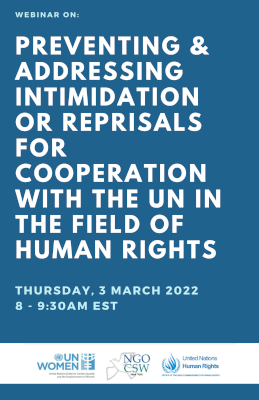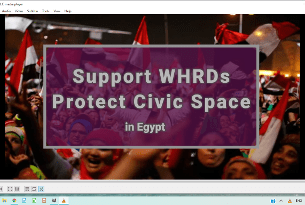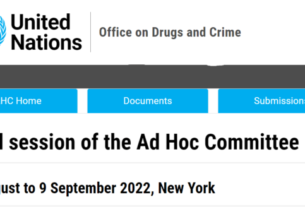
On Thursday 3 March 2022, the UN Women, the Office of the High Commissioner for Human Rights (OHCHR), and the NGO Committee on the Status of Women, New York (NGO CSW/NY), organized a webinar entitled Preventing & addressing intimidation or reprisals for cooperation with the UN in the field of human rights. The following is a summary of the event:
Introduction
Remarks from Victoria Diaz Garcia, UN Women:
The session was framed in the context of the upcoming 66th session of the Commission on the Status of Women (CSW-66), with the priority theme of achieving gender equality and the empowerment of all women and girls in the context of climate change, environmental and disaster risk reduction policies and programmes.
The priority theme of CSW-66 is especially critical for certain groups including indigenous women, human rights defenders, climate justice activists, and others, as they are often targets of different forms of intimidation, harassment or reprisal precisely because of the work they do.
The shift to online modalities of engagement since the start of the COVID-19 pandemic has allowed an increasing number of individuals and CSOs from around the world to participate at CSW; however, the shift has also presented increased challenges in terms of digital safety.
The volume of participants in this webinar (~600 registrants) speaks to the importance of this discussion on preventing and addressing intimidation or reprisals for cooperation with the UN in the field of human rights, in particular in the context of engagement during CSW66.

The session is a key component of enabling a safe civic environment to protect and promote the voices, agency and leadership of women, and gender equality advocates, to enable their meaningful participation in public life, including addressing the rising polarization and the backlash against the gender equality and women’s rights agenda.
This work is also framed within UN Women’s new strategic plan (2022 – 2025), and the strong collaboration between UN Women, OHCHR and NGO CSW.
Remarks from Ivy Koek, NGO CSW NY:
NGO CSW celebrates its 50th anniversary this year. This milestone will be commemorated in New York on Consultation Day during CSW-66. The first virtual NGO CSW Forum was held last year, having presented new opportunities and challenges. Strengthened focus was placed on virtual safety. NGO CSW created virtual safety guidelines and developed an email account for reporting cases of intimidation, reprisals, harassment, etc. A resource for parallel event organizers and participants was also produced to ensure events were as safe as possible. The resource goes over technical aspects (e.g., preventing zoom bombers) as well as the virtual safety guidelines.
NGO CSW has made it a priority to keep the online Forum safe for all CSW members and the public. Virtual safety guidelines are being streamlined for all virtual events.
Remarks from Dolores Infante-Cañibano, OHCHR:
“Your Freedom to engage with us is a fundamental human right, which we must protect and respect” – Office of the High Commissioner for Human Rights
This sentiment was discussed in the context of the upcoming CSW, with a focus on the risks associated with cooperation and participation in CSW.
Presentation of mandate and guidance on intimidation and reprisals for cooperation with the UN, by Venetia Paiz-Merino, OHCHR
Context:
We have a global context of eroding civic space and public freedoms, where the reported number and severity of intimidation and reprisals against those engaging with the UN has increased significantly in recent years. These events have a direct impact on the UN’s credibility, relevance, and ability to operate on the ground.
Definitions
- Reprisal: In general, this refers to restrictions on freedom of expression, freedom of speech, assembly, through repression, targeting, and persecution. A reprisal for cooperation with the UN has to be specifically linked to an act of engagement or attempted engagement with the organization.
- Cooperation: This refers to sharing information with the UN, giving testimony, submitting complaints to UN bodies and mechanisms, attending UN meetings, events, or trainings. The UN relies on the cooperation with human rights defenders, activists, who represent the voices of people on the ground. The impact of cooperation can target individuals, as well as their relatives, colleagues, or those who have provided legal and other forms of assistance.
- Intimidation: The second important piece of the UN mandate on reprisals. This refers to acts to discourage individuals or organizations from future participation or cooperation with the UN. It normally happens beforehand to inhibit that cooperation in advance. It can also happen during or after to deter an individual from cooperating further with the UN.
- Perpetrators can be state AND non-state actors (media individuals, nonstate armed actors, and more) – reprisals and intimidation are not limited to acts by government representatives.
Types of reprisals and intimidation
Examples include confiscation of property; travel bans; stigmatization; armed attack; detention; sexual violence; intimidating messages; movement restrictions; messages to family members; confiscation of ID; torture; smear campaigns; surveillance; online hate speech; financial audits on CSOs; raids on NGO premises, including the confiscation of equipment and files; and more.
Examples provided:
- In 2021, there were two cases of reprisals in the human rights council chamber (initiated by the Cameroonian and Cambodian governments).
- Religious groups and scholars in the Maldives shared online threats with a women’s human rights organization based on its submission to CEDAW, accusing the organization of contravening Islam. With collaboration from OHCHR, the Maldives government mediated between these different actors and the police, which yielded a positive outcome (not proceeding with the case lodged against the NGO).
- Travel restrictions (confiscation of passport) imposed by the government of Djibouti since 2018 on an individual cooperating with the Human Rights Council’s universal periodic review. The individual still remains without his passport.
- Complementary role of different actors – who does what in response to these cases?
- States bare the primary responsibility for protecting persons under their jurisdictions, including the responsibility to ensure prompt and impartial investigation into cases, engage directly with victims, and provide access to justice. States can be called on pre-emptively and reactively, with the consent of victims.
- Intergovernmental organizations/bodies (including EU, UN, AU) and embassies, which interact with activists beyond their national borders, also have responsibilities to do no harm (e.g., when inviting activists to the Security Council, Human Rights Council, UNGA, etc.).
- Since 2016, the UNSG has appointed the Assistant SG for Human Rights as the UN senior focal point to spearhead coordination and raise visibility of this mandate, including responses to reprisals.
- Non-state actors also have a responsibility to ensure unhindered access to the UN. Civil Society actors have their own key role.
Digital opportunities and risks
- Opportunities – greater participation online; stronger access and more affordable
- Risks – privacy and safety concerns. Additional security measures may attract attention or be illegal (for example, in some contexts, using certain security measures, like VPNs, could attract attention, making their use dangerous in certain situations).
Key takeaways: Engaging with the UN is meant to be empowering and give visibility to important causes. The risks are taken very seriously.

Presentation of NGO CSW/NY’s guidance and practice from representatives of the NGO CSW/NY’s network and partners:
Lina Abou Habib:
- Being in a virtual meeting does not make it less threatening. This poses risks of being recorded, tracked, harassed, and more.
- In the MENA region, certain ECOSOC accredited organizations display intimidation and harassment simply by showing up and taking feminist spaces.
- It is essential to identify the most vulnerable groups in the region (e.g. queer activists) to ensure that their needs are taken into accounting when trying to maintain safe spaces, even if that sometimes means excluding or removing harmful voices that spread toxic masculinity.
- The Arab Caucus meeting has started setting ground rules for participation and sharing the safety measures in place at the onset of meetings.
Alicia Wallace shared her own personal experience with reprisals directed at her while she was representing an NGO from the Bahamas during a CEDAW session in 2018. Following her calling out the Bahamian government’s missteps, her words were taken out of context and used by a radio
personality to convince the public that she was a threat to the country. The International Service for Human Rights (ISHR) in Geneva helped her submit a report to OHCHR.
Key takeaway: it is important to have allies and organizations that will stand up and support human rights defenders.
More details of her experience can be found here: https://culturas.us/2020/11/25/united-nations-and-human-rights-defenders-aparasitic-relationship/
Adriana Uex: Shared her own experience as a young Mayan woman from the Yukatan Peninsula. She emphasized the surge in threats and murders to those who defend the environment and combatting the effects of climate change, often directed at indigenous women, specifically. She highlighted the reprisal, criminalization, stigmatization and delegitimization of environmental human rights defenders, of indigenous women and their organizations, often in rural areas. Culture should not be used as an excuse to justify the violation of their rights and the criminalization of their work.
Highlighted existing protection mechanisms in Latin America for the protection of environmental defenders and population groups at risk.
We have a global context of eroding civic space and public freedoms, where the reported number and severity of intimidation and reprisals against those engaging with the UN has increased significantly in recent years.
Umyra Asma, AWID:
- All the examples of reprisals that were shared here today were fuelled by a global complex of increasing authoritarian, anti-rights, fundamentalist values, ideologies, and structures.
- Online violence cannot be separated from its offline continuum.
- It is important to be vigilant and protect our spaces, thereby limiting the oxygen for anti-rights groups.
- Not only do these threats present dangers to the lives of activists, but they also make it more difficult to push for states’ accountability.
- The UN space needs to be safe for human rights defenders and activists to speak freely on rights and justice.
- Presentation of UN Women’s measures planned for CSW66 by Martin Borgeaud, UN Women:
- UN Women has made it a priority to improve measures to prevent cases of reprisals and intimidation for engagement at CSW. This is work in progress and requires in depth analysis and long-term sustainability plans.
- UN Women has designed preliminary measures for CSW66 based on an analysis of the challenges that were identified in past convenings.
The 5 types of measures of focus include:
- Ground Rules: Information posted on CSW website; Code of Conduc; Messages sent by Senior Leadership; Moderation of events
- Information to participants: Via this webinar and information posted on the CSW website
- Sensitization within UN Women: through presentations and workshops
- Monitoring, reporting, and documenting: Use this email – civic.space@unwomen.org
- Longer term measures will be proposed after CSW
Key takeaways from moderated discussion and Q&A (segment not recorded):
- Inclusivity means that we don’t cancel each other out and that we have the right to not allow participation of groups that do not make the rest feel safe.
- Some groups seek to occupy the spaces that have traditionally been of the women’s rights organizations and feminist movements, and we cannot allow this co-optation to happen.
- Hate speech is when you prevent someone’s right to exist and live free. In the words of James Baldwin: “We can disagree and still love each other, unless your disagreement is rooted in my oppression and denial of my humanity and right to exist.”
- The importance of educating on the discrimination faced by different people and population groups around the world in order to change discriminatory narratives in different societies was emphasized by a survivor of human-trafficking.
- The importance of social media as a platform to educate and use one’s voice to raise awareness was also highlighted by another survivor of human trafficking.
- A suggestion was made for a short video message for the upcoming CSW session underscoring the universality of rights, the fight against the criminalization of activists as an overall message of freedom.
Reports about acts of intimidation or reprisal can be submitted safely through the following channels as relevant:
- For CSW: UN Women’s dedicated email address for the upcoming CSW is civic.space@unwomen.org;
- NGO CSW NY’s dedicated email is virtualsafety@ngocsw.org
- Anyone may reach out to ohchr-reprisals@un.org at any time to report reprisals cases associated with UN cooperation.
Links to the resources developed by NGO CSW:
- Virtual Safety Guidelines: https://ngocsw.org/wp-content/uploads/2021/10/Virtual-Safety-Guidelines-and-Principles.pdf
- How to Have a Safe/Secure Experience: https://ngocsw.org/wp-content/uploads/2021/12/Safety-at-NGO-CSW66-1.pdf
- Registration for the NGO CSW66 Forum: https://ngocsw.configio.com/pd/6/
- More information about the NGO CSW66 Forum: https://ngocsw.org/ngo-csw-66
- Registration for in person Consultation Day in New York at CSW: https://ngocsw.app.neoncrm.com/event.jsp?event=93&
- NGO CSW videos explaining the safety guidelines: https://www.youtube.com/c/NGOCSWNY
Closing remarks and key takeaways for CSW66 and beyond
- Protecting ourselves and others in all virtual and offline spaces is a significant priority.
- It is critical to hold states accountable for acts of nonstate actors and giving public support to human rights defenders.
- During and after CSW, be aware, be alert, and seek out support.
Resources
- OHCHR | Role of the United Nations in protecting and promoting civic space (https://www.ohchr.org/EN/Issues/CivicSpace/Pages/ProtectingCivicSpace.aspx#:~:text=OHCHR%20has%20a%20unique%20role,protection%20practices%2C%20including%20protection%20networks)
- OHCHR´s dedicated section on Intimidation and reprisals for cooperation with the United Nations in the field of human rights with links to SG´s annual reports (https://www.ohchr.org/EN/Issues/Reprisals/Pages/Reporting.aspx)
- UN Guidance Note on Civic Space and summaries in all UN languages (scroll down) (https://www.ohchr.org/EN/Issues/CivicSpace/Pages/UNRoleCivicSpace.aspx)
- OHCHR: Human Rights and Civic Space in the UN System Supporting Women Human Rights Defenders (https://www.ohchr.org/Documents/Issues/Women/WRGS/Supporting_WHRDs_UN_System.pdf)
- UN Women’s Strategic Plan (2022-2025)



